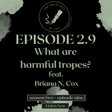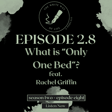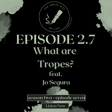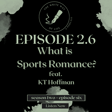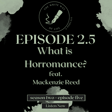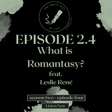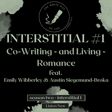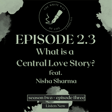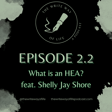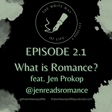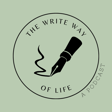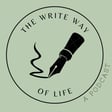Become a Creator today!Start creating today - Share your story with the world!
Start for free
00:00:00
00:00:01

What is Craft? - featuring Martha Brockenbrough - Episode 2 - Season One - The Write Way of Life
Join hosts Karis Rogerson and A.D Jolietta as they dive into the basic's of craft with their guest Martha Brockenbrough, the author of more than 20 books for young readers, including YA fiction and nonfiction, picture books, a middle grade mystery, and a chapter book series. This episode features a basic overview of the craft of writing itself.
Transcript
00:00:14
Speaker
Fuck, wait.
Guest Introduction: Martha Broganborough
00:00:16
Speaker
It is ah Saturday in February in 2025, and we are introducing our very first episode with a guest in which we spoke with Martha Broganborough.
00:00:28
Speaker
um I had a really good feeling after that call. What did you think? I was absolutely enraptured the entire time, ah which is evident in the recording because I think I speak once, only after being prompted by Karis.
00:00:42
Speaker
Which we didn't really know how the interview process was going to go.
Interview Dynamics and Reflections
00:00:46
Speaker
i suspected since Karis is so fantastic at interviewing people that I would mostly be tech support on the call, which I was, which I'm fine with.
00:00:56
Speaker
And then I was the teacher who called on you in the middle of class to be like, haven't heard much from Addy yet. What do you think? Which is always the best feeling in the world.
00:01:08
Speaker
That's why everyone loves those teachers so much. ah No, I think that this episode was was just really ah fantastic overview of what craft is.
Craft Masterclass with Martha
00:01:20
Speaker
And Martha especially is so knowledgeable. And the way that she explains things just makes so much sense that I truly like ah truly just felt that I was receiving a masterclass in the overview that is craft.
00:01:35
Speaker
um Yeah. I was lucky enough to go spend a weekend um at a retreat house that Martha has in Washington last October. And went with some classmates and we were chatting and Martha was like, does anyone have any questions about like craft or publishing? And I was like, yeah, Martha, I got a question.
00:01:57
Speaker
How do you handle it when your publishing career is taking five bajillion years to get started? And her answer, which I don't remember word for word, was the most helpful one that I've received in the over 18 months that I've spent trying to get my book published on sub.
00:02:13
Speaker
So we love Martha in this household. We do. We love Martha.
Joyful Discoveries: Lemon Spindrift and Literary Events
00:02:20
Speaker
But before we read you Martha's bio and dive straight into the interview, i would love to know, Addy, what is one thing, writing related or not, that has brought you joy this week?
00:02:36
Speaker
Oh, what a good question. Thank you. And what a hard question for this week. Fair.
00:02:46
Speaker
I would say this is going to be based in consumerism, but that's okay. Me and my lemon spindrift, I have one lemon spindrift. you know what spindrift is? No.
00:02:58
Speaker
Oh, I'm going to introduce this to you. It's it's changed my life. Well, caveat, you have to like sparkling water. Oh, no. oh Spicy water? No, no.
00:03:09
Speaker
Well, okay. It's sort of like if sparkling water and soda had a crunchy baby. Which is, I'm pitching this really horribly, but it's like a really refreshing, like sparkling water infused with real, it's not even infused with, like they actually put lemon water in it.
00:03:29
Speaker
Oh. Yeah. And so like it just tastes really fresh and like it's also just water and lemons essentially. So there's very little sugar.
00:03:41
Speaker
Which is great because I have an addiction to soda and have started using Spindrift. um instead of instead of less odor yeah on recommendation of my dentist um i don't think that they like the fact that i'm using spender but you know look an addict is an addict and i'm trying my best um but that's Yeah, the one spin drift that I have a day, I'll usually have it with my lunch, and it has oddly been like very comforting me.
00:04:12
Speaker
For some reason, i just I need my sparkling beverages ah to get me through this administration. That's my moment of joy. It's the little things, frankly. My moment of joy this week was sapphic literary speed dating at Barnes & Noble.
00:04:30
Speaker
And it was joyful because i met a bunch of really rad people. I had fun. And also it kind of felt like a big, you know, middle finger to the administration to be like, oh, you don't want us to exist. We're just going to gather and like make more friends.
00:04:49
Speaker
Yeah. You don't think we exist? Bitch, we fucking do. Fuck yeah.
00:04:55
Speaker
And we're going to get together and do some things. Yeah, we're going to talk about books. I did um very vehemently spread the gospel of Legendborn.
00:05:06
Speaker
um at one point, someone asked me, like, oh it was like, what book is your Roman Empire? and it was like, well, the Legendborn cycle. And the person I was talking to was like, let me write that down as like a recommendation. And the person next to her, whom I hadn't actually spoken to,
00:05:23
Speaker
leans over and goes, I just got that recommendation too. And then like the four of us had like a 30 second moment of like Legendborn.
00:05:32
Speaker
Amazing. Karis, can I confess? You haven't read Legendborn? That I've No, haven't. And I need to. I have the first book. I know you do need to.
00:05:44
Speaker
Do you ever have those things where like you know something is so going to be your thing? like it is just like ah it you're just You know you're going to be obsessed with it. You know you're going to love it.
00:05:55
Speaker
But you can't. can't touch it yet because you're the anticipation is so great that you're like I need to save this moment for for what I really need well here's the thing book three comes out in just over a month so you can just binge legend born and blood marked and be ready to rock into roll with oath bound There we go.
00:06:18
Speaker
See, past me was thinking ahead. Now I just get to consume three. And I'm so sorry to all of you who had to wait. No, you should be. It's a long wait, but it's worth it. But yeah, that was my pocket of joy.
00:06:31
Speaker
um So do you want to... Let's go ahead and dive into the episode. Do you want to read Martha's bio? Yeah. um Absolutely. All right. So...
Martha Brockenbrough: A Career Overview
00:06:45
Speaker
um
00:06:50
Speaker
All right, Martha Brockenbrough is the author of more than 20 books for young readers, including YA fiction and nonfiction picture books, a middle grade mystery, and a chapter book series.
00:07:02
Speaker
She founded National Grammar Day, wrote game questions for Cramium and Trivial Pursuit, and was co-chair of faculty at VCFA's MFA in Writing for Children and Young Adults program.
00:07:14
Speaker
The former editor of MSN.com, Martha has interviewed lots of celebrities, including the Jonas Brothers, Jason Bateman, Mike Myers, and Slash. Her work has been published in the New York Times. She also wrote an educational humor column for Encarta for nine years.
00:07:30
Speaker
She lives in Seattle with her family. Besides reading and writing, she likes dogs, cats, cooking, working out, and laughing. And with that... All right, we're here.
00:07:42
Speaker
all right. Thank you, Martha, so much for being with us today. We're here to chat the basics of craft.
The Essence of Writing Craft
00:07:49
Speaker
um When I say craft, I do mean writing craft, not arts and crafts.
00:07:53
Speaker
For anyone listening, that's the wrong podcast. um So, Martha, my first question for you is just very basic. If you had to design the concept of writing craft to a non-writer, how would you define it?
00:08:10
Speaker
Okay. So I would define it as the the magic that happens between the lines. You know, writing is just ink on paper, right? It's just words.
00:08:24
Speaker
It's just, and and yet it's magic. And craft are all the skills that we have to transform words into things that make you believe stuff that is not really happening, but it it it gives you real emotions. um Some people would call this mind control, which is evil.
00:08:47
Speaker
um But I just think it's the craft of writing. And it's what it's what turns spelling into spellings. belling into so and magic grammar right it's all it's all that stuff i love that it's what turns spelling into spells that's perfect um i remember um i started at vcfa which is the vermont college of fine arts where martha was co-chair about three years ago now and my first advisor was the amazing jasmine warga who is
00:09:19
Speaker
possibly the most brilliant person in the world i couldn't say for sure but she is but my first letter that i sent to her i was supposed to talk about craft elements in my piece and i just drew a blank i was so i asked her what is craft um so i really love your super concise and neat explanation of it, what would you define as some, like, what are some of the puzzle pieces that go into craft or like the ingredients of the craft soup?
00:09:51
Speaker
Okay, well, so, you know, if we're building something, we've got hammers which pound in nails. We've got screws and screwdrivers, several types that drive them in.
00:10:04
Speaker
um Elements of the writing craft are just like those tools. So a central one, Be character.
00:10:15
Speaker
um Who's the story about? What makes this person tick? What do they believe? What do they are? What are they so certain is true um at the outset of their transformative journey that they realize, oh, my goodness, not true.
00:10:32
Speaker
um at the end or, you know, what what um what belief do they have that has transformed? I mean, characters are whole bunch of things. Like, we are who we are.
00:10:42
Speaker
So, you know, we're where we were born. We're where we're we're um who we grew up with, were the foods that we ate, were the sounds that we heard, were the music that we listened to, were the movies that we watched, the books that we read, were our heartbreaks, were the pets that we've had and loved. um All these things that go into making a person and making their beliefs. And so this is like the center of what a story is.
00:11:14
Speaker
um And there are some things that I described, like where we grew up, that people would say, oh, well, but that's setting, right? It is. And setting is ah separate entity.
00:11:26
Speaker
And yet, um certain settings are totally intertwined with character, like your room, right? um Those of you who are listening, I'm looking at Karis right now on video and I can see rainbow flag back there.
00:11:44
Speaker
um That means something very specific, right? But someone who didn't have that cultural knowledge. wouldn't know what that meant. um You know, a five-year-old might think, oh, it's just a pretty rainbow.
00:11:55
Speaker
um And so this these are the ways that setting is different depending on whether it's new to you or whether it's familiar. So um yes, setting is an important element of craft.
00:12:08
Speaker
Plot. is important. And it's always interesting to me um when people say, oh, I can't do plot. And this is something that I say all the time. And then i slap myself silly and say, no, no, no, of course.
00:12:20
Speaker
Plot is what happens to the character. And the shape that the plot takes is determined by who the character is and where the thing happened to them.
00:12:34
Speaker
um You know, ah if you're, if it's a storm outside and you're inside, it's less of an important um plot event than let's say you were outside um walking home from school and all of a sudden, you know, a storm hits. It becomes totally different.
00:12:53
Speaker
um So all these elements, they interplay together. Structure is one of my favorite elements of craft. That is... how you tell it.
00:13:04
Speaker
um Do you tell it in linear fashion or do you tell it in reverse? Do you break it up a little bit? um A book that I really love is The Night Circus by Erin Morgenstern. And it took me a little while to figure out like, what, what is happening? And then I started paying attention to the dates and she breaks up. It jumps back and forth in time.
00:13:26
Speaker
And that is something that makes, that increases the tension of your story. And so like, As you're thinking about, well, how do I make the tools work for me? um Structure becomes one that that um you can increase the tension. You can let your reader know that something horrible is going to happen by starting off.
00:13:48
Speaker
and There's this book called by Charles Benoit called You, and it starts off with the main character describing um a fatal injury that they've just sustained. Oh, wow.
00:13:59
Speaker
So it's fairly tense. Like, how did they get there? And what happened? And what's going to happen next? And are they really going to die? No spoilers, but... yeah Anyway, so plot, we've got setting, we've got character, and we've got structure.
00:14:15
Speaker
Those are some of the big ones. um Voice also is significant. And people are like, oh, what's voice? Well, it's just, you know, how does the story sound and how does it make you feel?
00:14:28
Speaker
Like if we're listening to Cookie Monster, know, he very specific voice has. That's actually, I was a little more like Yoda. and But you know what I mean?
00:14:39
Speaker
Like, and you get an emotional, um, effect based on the voice. And, one of my writing students, this, um, high school senior,
00:14:51
Speaker
um who is neurodivergent. And that was, by the way, my cat knocking over some stuff in my office. po ca And so what he does is he'll send me, he'll say, okay, the voice of this character is like this. And he'll send me a song or something for a musical or whatever. And all a sudden it's like this distilled thing and I get it. And so I understand what he's doing and his writing is really consistent and interesting. And so um You know, this is one of these things that voice is developed by listening.
00:15:24
Speaker
um And you can listen to, um you know, anything from Martha Stewart to a Muppet and get inspiration for what the voice of your character might be.
00:15:36
Speaker
Those are some craft elements. was amazing. That was like a masterclass in craft elements. And had a million thoughts as you were talking and I was like, file that away for later. And now it's later. um And they're gone because everything that you said was just so much more brilliant than the first.
00:15:51
Speaker
um So I, I loved, okay, I'm formulating my thought as I'm speaking. But I when I first started writing, I didn't put too much thought into what I was writing. I would just sit down and I would put my hands on the keyboard and I would see where the story took me.
00:16:12
Speaker
And I wrote like four books like this and I queried two of them, which was foolish. But I mean, i was young and full of dreams. And one thing that have learned lately about craft is that there's a lot of intentionality in writing or in the best of writing, it feels like.
00:16:29
Speaker
So when you're writing your first draft, are you thinking all of these craft thoughts? Are you putting every single layer of the story into the first draft? Or is this like process?
00:16:43
Speaker
Oh yeah, definitely, definitely not.
The Writing Process: A Gradual Journey
00:16:46
Speaker
Um, I mean, I wish that I could, but in a way, so, all right. My house is 36 steps above the street.
00:16:56
Speaker
When I go grocery shopping, I would really love to make just one trip up with all of the bags. Can i No, I cannot. Um, and I, you know, it's too much.
00:17:08
Speaker
It's too awkward. And ultimately it's more efficient to make many light trips. And I think this is a really good way of viewing writing.
00:17:19
Speaker
We're just making many light trips up the stairs. And the reason for that is like, you probably could climb the stairs one time carrying hundreds of pounds of um But you would never want to do it again. And you might get hurt on the way.
00:17:39
Speaker
The bag might rip. The suit might drop and spill. Better just to do what you can. And like writing a novel is a huge undertaking. So how can you break it down? How can you just get one thing done today? So I've recently started on a new novel.
00:17:57
Speaker
And um it's one that's going to require ah ton of research. I am not doing all of that research at one time because... It's just, it's too much.
00:18:11
Speaker
And so I've divided my novel into chunks. Where and when does this take place? Where and when does that take place? And so I'm sort of um writing the pieces as I go.
00:18:24
Speaker
And that is one way that I am breaking down. And so, yeah, you you just some people maybe can get a first draft that has everything in it.
00:18:36
Speaker
um But I am happy when the first draft has enough in it that I still care. Nice. I love the grocery metaphor because I'm that person who's like, I'm only doing one trip.
00:18:50
Speaker
It doesn't matter if I fall over halfway up the stairs and break my back and also all of the bags. And I feel that way sometimes with writing too, where I'm like, I just want to, I just want to get it done.
00:19:01
Speaker
um So I really love that. Like, it's like a reframing and a new way of looking at it. Yeah, you can only do so much at one time. And you can always make something better and more magical. Alana K. Arnold sometimes goes back over scenes and she describes what she's doing as thickening them.
00:19:21
Speaker
And I really like that because it does feel like that. You know, you're adding just, you know, once you've kind of got down, like, here's my character, here's where they are, here's what they want, here are the obstacles, their antagonists, whatever.
00:19:36
Speaker
um and you kind of get the basics down, then you can always thicken it. Sometimes it's cutting stuff out, but sometimes it's just adding little things or little misdirection.
00:19:46
Speaker
um and that is really fun. Like once you know what you're doing, um but you don't really know what you're doing until you've got draft.
00:19:58
Speaker
I think that's also really helpful for specifically new writers who might be feeling overwhelmed. I know when I first started learning about craft and techniques to make the book shine and things like various acts and the denouement and the climax and, you know, everything like that, I was like, how am I going to do this?
00:20:18
Speaker
That's impossible. So breaking it into steps kind of I like to joke that it's like Shrek because Shrek is like an onion and an onion has layers. So it's a convoluted metaphor, but I like it.
00:20:32
Speaker
like I get it. I get it. OK, so do you remember learning to walk? Not even a little bit. Not even a little bit. OK. Walking is really complicated.
00:20:43
Speaker
And yet you learned how to do it. Nobody taught you the craft of walking. You just kind of kept trying and got used to it and practiced, okay? So writing is also like that.
00:20:58
Speaker
There's a whole bunch of skills to learn. And there's a lot of stuff that you already know from reading. If you've read a lot of books, you already know bunch about k craft. You just don't know that you know it.
00:21:12
Speaker
And so this is where it's okay just to write from the heart, to write from the gut. All right. Then once you've got something, then you can introduce your brain and say, OK, so what am I really doing here and what's really happening and slow it down and, you know, then analyze problems come when.
00:21:36
Speaker
so. There's writing without understanding any craft at all, and probably you're only going to get so far. Then there's like when you start to study the craft and you've got all these concepts in your head and they're just in your head, you haven't yet practiced them enough so that they're in your body like walking is.
00:21:57
Speaker
um And so it's going to be really super unwieldy. And, you know, I've I do this this um kind of consulting thing called novel therapy and people will sit with me and I'll talk to them about, oh, you know, here's your character, here's what you're working on, I'll ask questions. And the idea is to help them see their story and just feel their way forward.
00:22:21
Speaker
So I had this one wonderful client who was like, okay, but, you know, here's the all the character archetypes and here's their relationships and here's, and I was like, no, no, no. and What does your character want?
00:22:34
Speaker
Like stop thinking about your story as this big, complex interplay. And what your character wants and believes and what their limitations are, that's going to everything else comes out of that.
00:22:48
Speaker
Like there is no, um you know, platonic form of the story where you can just fill in all these boxes and then have your writing emerge to fill that. I mean, you know, maybe someday some lunatic will make the artificial intelligence algorithm that does that.
00:23:09
Speaker
um But it's it it just good stories feel organic. um And that means they've come from lived experience that's been expressed through the artistic mediums of, you know, a specific character you've created.
00:23:31
Speaker
um They're not check boxes and formulas, although those things can help later. I like that in addition to writing novels, I write a lot of personal essays.
00:23:44
Speaker
And one thing I learned during guess like my training as a personal as essayist is that The best essays are very specific, you know, like it's about my experience growing up, how I grew up with the parents I had.
00:24:00
Speaker
And then maybe there's something universal to come from that. But if I try to write a piece that's going to be universal, it's not going to tick for anyone. And that's what I was thinking when you said, like, you start with your character specifics rather than the overarching.
00:24:13
Speaker
huge umbrella of the novel is it it always makes more sense to start narrowed in and focused and with a small detail and then you can slowly expand and build your world.
00:24:26
Speaker
Yes, that's exactly. i For me, that's how it works. And You know, there's as many ways to write probably as there are writers. um But my favorite kind of craft advice is the advice that helps me get words on the page.
00:24:46
Speaker
um ah You know, and that helps me feel like um my story is moving somewhere.
00:24:58
Speaker
um And so this is where, you know, another thing that I think about when I'm starting off with this character and what they believe and kind of, you know, knowing what's going to happen to them is where might they be at the end?
00:25:13
Speaker
And how might they get there? And there's going to be surprises along the way. But like, you know, I've got this character. who um you know
00:25:24
Speaker
believes what his gods and his country tell him um and supports wars being waged in the name of God and country. And at the end of the story, it's going to have a very different view.
00:25:40
Speaker
And so how do I get him there? And I know that's like the shape of the story that I want to write. And so those are things that become constraints. And like, you know, so this is where my character believes, well, why does he believe this at the beginning?
00:25:57
Speaker
And, you know, what are the things that are going to happen to him to question those beliefs? So now that we've talked a lot about overarching, just general craft, I would love to know if you have suggestions for self-teaching, well, teaching yourself
Learning and Supporting New Voices
00:26:19
Speaker
craft. Like what what books would you recommend? what Would you recommend, like do people need to get um MFAs in order to become good writers? so Okay, so let's talk about the MFA thing.
00:26:32
Speaker
um I don't have one. I wish that I did. um i was just not able to um get one um and do the freelance writing that I was doing and I was homeschooling my kids. I just, it didn't work out for me.
00:26:51
Speaker
um I absolutely loved being part of the VCFA community and I loved to teaching. um You don't need an MFA to be a published writer.
00:27:03
Speaker
You don't even need an MFA to teach in an MFA program. um So what's the point of an MFA?
00:27:12
Speaker
So the point of an MFA is that um it is worth studying something you love in community with other people um who become your fellow travelers um you know through life.
00:27:31
Speaker
um It is worth building these relationships. So how do you teach yourself writing without that? Um, I read a ton of books and when I really loved a book, I would have a notebook and write down like, here's what's happening and here's why it's working on me. I mean, and the you know, very similar thing that you might do, um in an MFA program is right.
00:27:55
Speaker
You know, they're called critical essays. I think craft essay is a better term for them, but like, you know, in the book thief, Um, death is the narrator and death tells you who's going to die.
00:28:08
Speaker
So why do spoilers make the book thief a more gripping read? Um, and so like I would write myself little things that explained that and explained, you know, why choices had the effect on me that they did.
00:28:22
Speaker
Um, I also was in a critique group, um, of other serious writers and, you know, many people in that group have gone on, think pretty much all have gone on to publish.
00:28:35
Speaker
Um, and so that was another thing I used to go to conferences, um, and, you know, just listen to people. So it's just as much as you can immerse yourself in how books work.
00:28:51
Speaker
Um, and as you're doing that, um, you know, ponder who you are and what you believe about things.
00:29:07
Speaker
um What's your point of view as an artist and as a writer? And what do you have that's new? And so there's, you know, there's like what happens in books, but then there's what happens in you.
00:29:21
Speaker
And great books are made ah um by people who are fascinated with what it means to be alive and who have some um things to say and who know how to conjure up the emotional um experiences on the page that will make readers think.
00:29:42
Speaker
um and And that's what makes books so incredibly magical. So anyway, yeah, you don't need an MFA. You can kind of give yourself, it's funny. um Nova Rensuma and I had this Facebook group we called Rogue MFA. And this, we were like just doing it on our own.
00:30:02
Speaker
And then she went to teach at VCFA and and I followed her there. And so, um you know, this work is for people who love the work and it,
00:30:13
Speaker
it It's, i mean, i love doing it because it makes me humble. um It um continually asks me to be compassionate.
00:30:28
Speaker
um It feeds my curiosity. Um, it, um, demands constant reinvention. mean, all things that I think make for a good life.
00:30:42
Speaker
Um, and you know, the kind of truth telling that we aspire to do on the page, um, the understanding of what courage looks like, um,
00:30:54
Speaker
As you spend your life writing this way, I think you can make yourself into a better person. um And that's pretty satisfying. you really like that because I have long been a believer a very controversial take, which is that you cannot separate the art from the artist.
00:31:12
Speaker
And because so much of art comes from who we are deep inside and even just the way I view the world and my, my biases or my shortcomings mean that maybe I don't see something one way. And so of course my art is intrinsically tied to who I am and how I act in the world. And
00:31:34
Speaker
I almost just like went. I was like, and that's why we don't read Hillbilly Elegy. um There's lots of reasons for why we don't read that. It's interesting. And okay.
00:31:47
Speaker
So I agree with you. You can't separate the artist from the art. Like the only times people want to is when the person creating it is so reprehensible.
00:31:59
Speaker
um So and and sometimes we don't find out that they're reprehensible until after we have internalized the patterns of their work and made them part of their identity or identities and love them. And so it's really it can be hard to let that go.
00:32:15
Speaker
um And so, you know, you don't have to. I mean, you could still like those books. You could still read those things. um But, you know, for me, ah that that's the point where I stop supporting and promoting that art publicly.
00:32:31
Speaker
Because guess what? There is not a shortage of artistic brilliance. What we have a shortage of is attention. What we have a shortage of is ways of finding this great stuff.
00:32:47
Speaker
And so I would rather, um you know, once someone has been JKR'd, once someone has been exposed to being Neil Gaiman...
00:32:59
Speaker
Find someone else. um And guess what? You know, they're already out there and we've been reading them and there's more people and there's going to be more new writers. And, you know, it's it that is um who deserves our time and attention, I think.
00:33:16
Speaker
Yeah. And I think you're 100 percent right. There is. Not a shortage of brilliance in the world. And this is something I've learned partly, you know, from being in writing groups, partly from being at VCFA. I just I'd run into people and read their work. And I was like, well, shoot, you're really good, too.
00:33:32
Speaker
Like, how is everyone so good? um And so I really love that the idea of like when, you know, sometimes artists disappoint us. And so we can. Find new artists to support and hope that they don't disappoint us too.
00:33:49
Speaker
But there's always going to be more art and more brilliance. Yes. um Let's see. What is, do you have like a piece of craft advice that you have been told or that you hear a lot that you think is just abysmal?
00:34:08
Speaker
Well, you know, some people only share craft advice because it works for them. And so I'm all over, you know, if it works for you, booyah.
00:34:21
Speaker
um So it's hard. i i And if it's something that doesn't work for me, my brain's like, let it go, let it go. um and so I'm much better at like, well, works for me. guess...
00:34:35
Speaker
i guess Oh, yeah. Chuck Polanyiak has some dumb stuff that he says um where he doesn't want to see your characters thinking or feeling anything. It should all be shown and you cannot use those words.
00:34:51
Speaker
And I'm like... Yeah, you can. And it's still, there's plenty of books that readers respond to that, you know, don't follow the Chuck Polaniak advice. And so sometimes when people give advice like that, that's so like restrictive, i don't find that to be particularly helpful.
00:35:15
Speaker
um So yeah, that's it. Sorry, Chuck. Chuck, I think he can handle it. We just talked off.
00:35:25
Speaker
and what about um so it's like you just said there's no like universal piece of advice right like for one person making an outline will be revolutionary and for another person making an outline will absolutely stifle them but what is maybe a a basic like piece of overarching craft advice that really works for you Um,
Drafting Strategies and Bold Art in Hard Times
00:35:49
Speaker
okay.
00:35:49
Speaker
So this is one gosh, maybe 12 years ago, i was taking a class from the great Anne Ersu. And i was struggling to finish the game of love and death.
00:36:04
Speaker
Um, because I, you know, I wanted to carry all the groceries at the stairs. I wanted it to be good. Blah, did he blah. And I just like kept getting to this point and sort of running out of steam.
00:36:16
Speaker
And so what Anne said is just right to the end, stop messing with the beginning. Don't worry. Just, just right to the end. And so i did.
00:36:27
Speaker
um i um took that class with her in November. And i think by January, I had finished the draft. um And it was only once I had a draft that I could really start making the book good. It was always a good idea. It was funny. Like, I used to read Goodreads. I don't anymore. But what does somebody said in another writer's hands, this book would have been so good because it's a really good idea.
00:36:50
Speaker
This is why we don't read Goodreads. um And um so, yes, there's the idea behind the book, and I knew it was a good idea.
00:37:02
Speaker
But execution, of course, is the hard part. and And, you know, that takes stamina. Yes. Yes.
00:37:13
Speaker
Stamina. That is an under, maybe undervalued, like, attribute that writers need. I didn't realize this when I was a new writer. I was like, I can write a book and I'll publish it and do this for the next 70 years.
00:37:27
Speaker
And it didn't occur to me that that would be hard work and I would need to, like, be, you know, have stamina. So something I've learned over the years. um I have two questions that I think I'm going to put later. But before we do, is there anything else?
00:37:45
Speaker
They're like closing questions. Is there anything else that like comes to your mind that you want to share or anything that you wish I had asked? OK, so like how do you get through a whole draft of a book? Because that's the hard part, right? And so I've found lots of little ways that help me.
00:38:01
Speaker
And maybe they help you. Maybe they'll help someone. ah Maybe you can come up with a variation. When I'm drafting, I like to, you know, I know i know roughly, okay, this is going to be 80,000 words or whatever.
00:38:13
Speaker
And so I set daily goals. um And I check in with friends. um And so that's a really helpful thing. And one of the things I noticed in keeping track of stuff on a spreadsheet, if I'm a steady writer, if I kind of go about it like every day just a little bit, um it's better than if I try to get, you know, oh, I just wrote 8,000 words and then I'm spent. okay So slow and steady and keeping track.
00:38:42
Speaker
That's one thing. and Another thing is keep track of what story you're writing. And so I am not big on outlines because I find that that starts to make it um be outside in rather than inside out.
00:38:56
Speaker
um But I do love to write a short synopsis of the book that I'm writing. And, you know, just a page. And I give myself 20 minutes to write it. Just, you know, that that whole just letting it flow on out.
00:39:08
Speaker
That's where I do that. And then as I'm drafting and I get stuck, I just look at my, oh, you no, is there anything here that's useful? And as my story wins and takes more um distinct shape, I change that rough synopsis.
00:39:23
Speaker
So then by the end, i kind of have an actual synopsis of what has happened in the book. So little bits of progress every day, if you can. um And you know keep like a thumbnail-sized view of your big picture so you know you where you're going.
00:39:42
Speaker
So it's like you got your map, your synopsis, and then every day you, you know, you get your, your little walk in. um Oh, and, and the best place to write often is not at your keyboard.
00:39:56
Speaker
So if you're washing dishes or if you're on a commute or if you can't fall asleep or whatever, think about your story. Think about a scene. um And i very often will kind of come up with ideas. And then I'm very excited when I hit the keyboard because my hindbrain has already been at work for me.
00:40:17
Speaker
So, yeah um, Addy, is there anything that you have a burning craft question? i don't, I'm just in awe of this entire conversation. It's been fantastic.
00:40:28
Speaker
No, it's been just great. all I feel like I got an MFA. Right. The beauty of talking to Martha Brokenbro, you get an MFA in 33 minutes. And you get an MFA.
00:40:39
Speaker
And you get an MFA.
00:40:42
Speaker
um so this is a silly question and i i love silliness so we're asking it but are you are you familiar with the concept of like a hear me out like a person that you're like nobody would ever go for this person but like hear me out i've i'm familiar so and you know the bookish community loves our villains so who is your book villain hear me out who had a point
00:41:12
Speaker
Oh my goodness. um So many villains. Okay. Okay. I'm going to, I'm going to hear me out. The Runaway Bunny. The Runaway Bunny is an absolute nightmare story.
00:41:25
Speaker
um ah You know, it's the Terminator, but with bunnies. Mom's like, I'm going to follow you. I'm going to chase you. I'm going to, anyway, um she's the villain of that story. And yet,
00:41:36
Speaker
hear me out. She just loves her kid and doesn't want her bunny to get turned into a pie or whatever. So yeah yeah hear me out. The runaway bunny, the mom is the Terminator. And yet I totally get it.
00:41:50
Speaker
Makes sense. Makes sense. Moms often have a point even when you don't want them to. I hope my mom's not listening to this because then I'll never hear the end of it.
00:42:01
Speaker
That, I believe, is all the questions that I had prepared. So unless Addy or you Martha, have anything else you would like to add, i believe that is our interview. Okay, I want to add one thing. um We are entering a hard time in the history of this country.
00:42:21
Speaker
um There have been hard times before. Hard times are the crucible for great art. And so i want people to feel all the hard times. I want people to care about everyone who um is in danger and is suffering. I want everyone to write bold and brave stories and be unabashed in this.
00:42:45
Speaker
Let us take this hard time and make some of the best art the world has ever seen.
